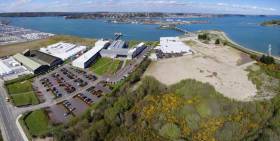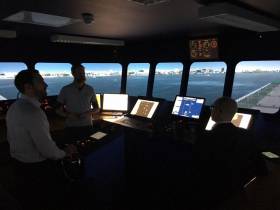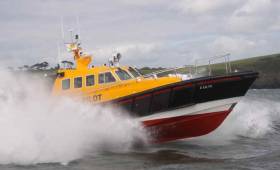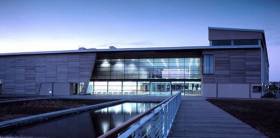Displaying items by tag: NMCI
EirGrid Addresses NMCI Seafarers’ Conference 2024 on Plans to Connect Offshore Wind Energy to the Grid
EirGrid, the Irish company responsible for operating and developing the electricity grid and market, spoke at the National Maritime College of Ireland Seafarers' Conference 2024 today about its plans to connect offshore wind energy to the grid and its ongoing engagement with key stakeholders like fishing and coastal communities.
As part of Ireland's transition to a low-carbon future, EirGrid has been tasked by the government to deliver a plan-led approach for connecting offshore wind to the electricity grid. Michael Mahon, Chief Infrastructure Officer at EirGrid, outlined that this will involve the delivery of grid transmission infrastructure to connect offshore renewable energy resources to points on the south coast.
To achieve this, EirGrid will need to build new electricity substations and associated undersea electricity.
Maritime College Head Says Opportunities of Irish Offshore Projects Are There for the Taking
Ireland is well placed to seize the opportunities presented by a boon in offshore projects, according to the head of the National Maritime College of Ireland (NMCI).
Speaking to The Journal ahead of the NMCI’s third annual Seafarers’ Conference next month, Paul Hegarty says all the potential is there to train and support the huge workforce that large-scale offshore wind energy (OWE) and other projects will require.
And while he says the NMCI already provides much of this training, both practical skills for mariners as well as supply chain and logistics, he also acknowledges there are gaps in its curriculum that need to be filled.
For instance, it does not currently cover pilotage of remote operated vehicles (ROVs) which are critical for the planning, installation and maintenance of subsea cable networks for power delivery from wind farms.
Hegarty also has ambitions of expanding the NMCI beyond its Cork Harbour base to satellite campuses — particularly on the East Coast where the bulk of OWE projects approved in last summer’s State auction are located.
The Journal has more on the story HERE.
‘Realising Ireland’s Maritime Ambition’ - NMCI’s Seafarer’s Conference 2024 is Announced
The National Maritime College of Ireland (NMCI) has announced its third annual Seafarers’ Conference, ‘Realising Ireland’s Maritime Ambition’, which will take place on 22 February 2024 in the Castletroy Park Hotel in Co. Limerick.
The conference, sponsored by Simply Blue Group, will bring together representatives from Government Departments, maritime industry, supply chain workforce, and training & education institutions both nationally and internationally to explore the opportunities to support and grow the fishing and offshore wind industries in Ireland. Considering the climate crisis, Ireland’s ambition for offshore renewable energy is large. Equally, considering the biodiversity crisis and the importance of food security, the ambition for sustainable fishing and seafood is of central importance to Ireland’s coastal communities and beyond. As humankind looks seaward for solutions the necessity to plot a coexistent future at sea is of central importance. Ireland will need to prepare its maritime industry’s capability and capacity beyond anything that it has achieved to date if it is to realise its ambition.
Panel chairs Captain Brian Fitzgerald, Director of External Affairs and Stakeholder Liaison, Simply Blue Group; Commander Roberta O’Brien, Associate Head of College, NMCI; Paul Hegarty, Head of College, NMCI; and Peter Coyle, Chair Marine Renewable Industry Association will lead discussions on topics such as Enabling Ireland's Offshore Renewable Energy Ambition; Enabling Ireland's Fishing Industry Ambition; The International Experience of Meeting Maritime Ambition; and What Will Success Look Like in ten years’ time - 2034; with contributions from a broad range of leading experts on each topic, followed by individual presentations.
Speaking at the announcement of the 2024 conference, Niall Collins T.D., Minister of State at the Department of Further and Higher Education, Research, Innovation and Science said: “Ireland needs to support and generate employment in our offshore industries, ensuring that our vitally important sustainable seafood industry thrives in parallel with meeting climate action targets from the development of offshore renewable energies, protecting biodiversity in our oceans, and delivering suitable further and higher education programmes, while supporting and enhancing the skills needed to promote these sectors. The annual NMCI Seafarers’ Conference is an ideal platform for sharing ideas and practical solutions to help these sectors grow and thrive.”
Paul Hegarty, Head of College, NMCI commented: “The National Maritime College of Ireland is delighted to once again host Ireland's maritime stakeholders to our third annual Seafarers' Conference at Limerick. The provision of maritime education and training will be a central plank in Ireland's ability to realise its maritime ambition. I very much look forward to welcoming participants in person and online and once again to engaging in conversations around our shared maritime future on this island nation.”
Captain Brian Fitzgerald, Director of External Affairs and Stakeholder Liaison, Simply Blue Group, said: “The NMCI Seafarers’ Conference is an important forum for coming together and encouraging open, expert discussion on the challenges and opportunities for the fishing industry, the offshore renewable energy industry and relevant Government Departments with a view to plotting the way forward to a sustainable and coexistent future.”
The National Maritime College of Ireland (NMCI) has announced the launch of its second annual Seafarers' Conference which is take place on 23 February and be held in Co. Limerick.
This year's theme is 'Thriving Fishing, Thriving Offshore Wind, Thriving Ports' and the hybrid event is to take place in the Castletroy Park Hotel. The venue is situated close to Limerick city and is just minutes off the M7 Dublin motorway.
The conference, sponsored by Simply Blue Group, will once again bring together representatives from Ireland’s maritime industry, supply chain workforce, and training & education institutions to explore the opportunities that exist to support and grow the fishing and offshore wind industries in Ireland in tandem.
Speakers at the event will include Caroline Bocquel, Interim CEO, BIM, Noel Cunniffe, CEO Wind Energy Ireland, Brian Hogan, Chief Surveyor Marine Survey Office, and Norah Parke, Project Coordinator Killybegs Fishermen’s Organisation Ltd.
Further speakers will be announced soon.
Among the topics for discussion include what the fishing industry needs to thrive; the policy regime for renewable energy; implementation of the ‘future skills needs report’; the ecosystem impacts of offshore wind farms; and the future for Ireland’s fishing ports.
To register in attending this conference in-person, click HERE or alternatively to attend 'online' visit this LINK.
National Maritime College of Ireland (NMCI) Open Day - “Let’s Sea What You’re Made of”
The National Maritime College of Ireland (NMCI) is to host their annual 'Open Day' next week at Ringaskiddy, Cork Harbour on Tuesday 8th of November between 10:00-15:00hrs.
The careers event will provide an opportunity to meet Shipping Companies and Organisations at the NMCI campus which is located beyond the ferryport in Ringaskiddy in the west of Cork Harbour. (For directions see further below).
Career Presentations
- Marine Electro-Technology
- Marine Engineering
- Marine Nautical Science
Presentations will be provided throughout the day on the theme of a maritime career held at the Main Lecture Theatre. These will start at 10:00 and will continue at regular intervals until 15:00.
- Meet the students and lecturers
- Ample parking and catering facilities
Tours of the College
During the Open Day, there will be group tours of the college that will be held at regular intervals. The tours will feature some of the college's specialist facilities among them:
- The high-tech ‘Bridge and Engine Room Simulator’
- The panoramic ‘Chartroom’
- Workshops
NMCI is an approved national centre for education in the maritime sector and is a constituent college of Munster Technological University (MTU). For further information, email: [email protected]
Directions to NMCI: follow the car ferry symbols on all road signs around Cork city. This will bring you to the village of Ringaskiddy, and then the college campus is situated on the left about 500m after the turn off for the ferry terminal.
FOI Docs Show Naval Service Upset Over IMERC Shutdown
#IMERC - Documents seen by the Irish Examiner show that the Naval Service was against the shutting of the Irish Marine and Energy Research Cluster (IMERC) earlier this year.
A joint marine research initiative of CIT’s National Maritime College of Ireland, UCC’s MaREI Centre for Marine and Renewable Energy and the Naval Service, IMERC was wound down on the foot of a 2016 report commissioned by the two colleges which concluded it was “not fit for purpose”.
But records obtained under the Freedom of Information Act show that navy officials believed the decision was “short-sighted” and “did not highlight the substantial achievements and impacts of IMERC” since it was established in 2011.
Moreover, it was claimed the report that prompted the decision to disband the Cork Harbour-based initiative was flawed, containing a number of inaccuracies — a sentiment shared by business start-ups using the cluster.
The Irish Examiner has much more on the story HERE.
INFOMAR Seminar Takes Place In Cork Next Week
#INFOMAR - This year’s annual seminar for the INFOMAR programme will take place next Wednesday 15 and Thursday 16 November at the National Maritime College of Ireland on Cork Harbour.
The Integrated Mapping for the Sustainable Development of Ireland’s Marine Resource (INFOMAR) programme is a joint marine science venture between the Marine Institute and Geological Survey Ireland and is funded through Department of Communications, Climate Action and Environment.
‘Collaborating for Better Marine Resource Management’ is the theme of this year’s INFOMAR seminar — held in partnership with the NMCI — which aims to provide an open, informative and engaging platform bringing together Ireland's key marine stakeholders.
The format will include quality presentations, demonstrations and networking opportunities. See the seminar agenda for the two days, and register for the free event via Eventbrite.
National Maritime College of Ireland (NMCI) Open Day In October
#NMCIopenDay - The National Maritime College of Ireland (NMCI) is set to open it’s doors next month to the public for the annual College Open Day on Thursday, 26th October.
The nautical education training college located at Ringaskiddy, lower Cork Harbour will be open between 10:00 and 15:00. (Booking is required for large groups). For contact details, see below.
The following is how the NMCI descibe themselves as the first third level college in the country to be built under the Government’s Public-Private Partnership scheme. The Public-Private Partnership (PPP) is a partnership between the public and private sector for the purpose of delivering a project or service traditionally provided by the public sector.
In this case the public partners are the Cork Institute of Technology (CIT) and the Irish Naval Service (INS) and the private partner is Focus Education. This model allows the college management and teaching staff to concentrate on education while the private partner is responsible for services to the college and the maintenance of facilities.
Please email the NMCI to: [email protected] or telephone Noreen on 021-4335607 for further information visit the NMCI website here.
Conference: Pilotage Today… & Into the Future
#Pilotage - The Irish Institute of Master Mariners, together with the Port of Cork, NMCI Ports and the Nautical Institute (Irish Branch) are to host a major conference on Pilotage.
The two-day conference at the National Maritime College of Ireland takes place on 3-4 November.
A range of presentations, to include a major P & I Club, serving pilots and a serving shipmaster with Maersk promises to be a most interesting two days. It is to be hoped that all pilots around Ireland who are free to do so, will attend and contribute.
Equally, the conference will be of interest to Harbour Masters and Pilotage Superintendents, as well as serving shipmasters.
Delegates fee is €50, to include all meals and an evening buffet.
Closing date for booking is next, week on Thursday, 20 October.
Registration at next month’s conference is 12 noon Thursday, 3 November. Conference concludes following day at 14.00 Friday, 4 November.
For further details and limited number of accommodation rooms at special conference rates, contact: [email protected]
Minister Confirms Course Approval As TD Cites 'Bad Blood' Between Maritime College & MSO
#CourseDispute - Controversy over the approval of maritime college courses "raises questions" about Ireland's marine authorities, says a Donegal TD.
As Donegal Now reports, Thomas Pringle was speaking in the Dáil after Transport Minister Shane Ross confirmed some 400 seafarers who graduated a refresher training course at the National Maritime College of Ireland (NMCI) would have their qualifications recognised by the Marine Survey Office (MSO).
All mariners are required to have completed the refresher training by 1 January next year – but the NMCI says the MSO refused to accredit its relevant course despite approval being sought at least 18 months ago.
Deputy Pringle noted that the NMCI "still hasn’t heard from the MSO. The minister confirmed there is bad blood between the office and the maritime college.
"If this is the case, this is not normal and raises questions around capacity of the office to administer marine matters.”
Donegal Now has more on the story HERE.

































































